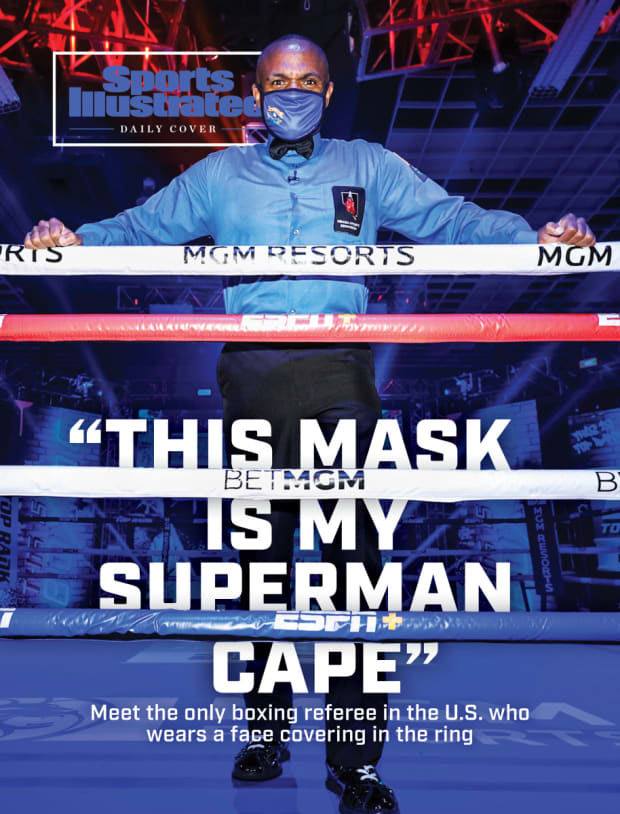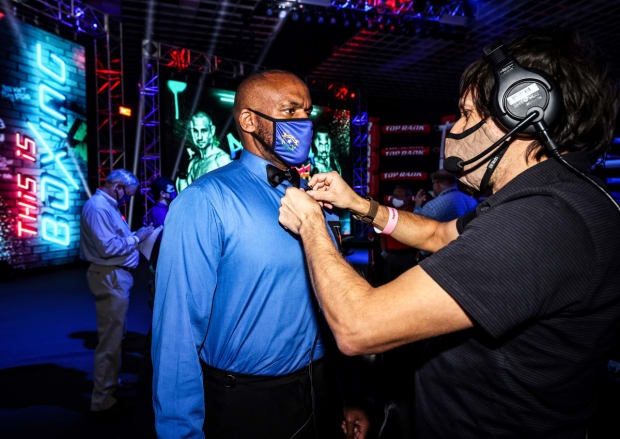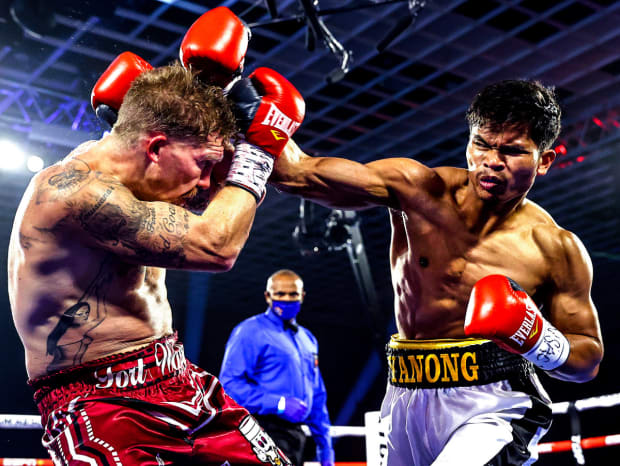In Nevada, where the sport first returned, face coverings are optional in the ring. For referee Robert Hoyle, the decision to strap one on was easy.
Robert Hoyle served 21 years in the Air Force, then forged a second career in boxing. He became the first licensed Black judge in the history of the Nevada Athletic Commission. In fact, he’s the first person, period, to be licensed as both a judge and a ref in the state, the boxing capital of the world. For more than 10 years, across 500-plus bouts, Hoyle has monitored lightweights and welterweights and heavyweights, standing up close to contenders and unknowns as they swing away and absorb blows. He has traveled to every continent except Antarctica, separating fighters and penalizing their transgressions everywhere from Tasmania to Thailand to Tokyo.
All of which is to say that Hoyle, in all his 52 years, believed he had seen everything that a person in boxing could see, in a sport where the bar for absurdity could not be higher. There was that time in Mexico where the organizers at one fight couldn’t find a ring bell, so they banged a monkey wrench on the corner post instead. Or that other time in Guatemala, in the same jam, where an official downloaded and amplified a boxing-bell app in lieu of the real thing.

During all those fights—in front of unruly and sparse crowds, when fans have behaved and when they’ve thrown full beers his way—Hoyle wore basically the same uniform: black boxing boots, black pants and whatever color shirt (blue, black, green ...) the presiding governing body required. Whenever he was back in Las Vegas, his hometown, he’d designate shopping days; and when he found the right shirt, or maybe pants just loose enough that he wouldn’t worry about them ripping, he’d go all out and buy in bulk. Never did he consider all the fluids and particles that landed on those uniforms, all the blood and spit and snot and sweat and germs. So many germs. On most nights he’d work multiple fights, and when those ran consecutively he would go without changing in between. He’d referee bouts wearing a shirt that suggested to the audience that he’d just been in a fight himself.
That all changed, though, on June 16, when Hoyle entered a disinfected arena on the Strip and climbed into a boxing ring sporting a new addendum to his wardrobe. Even by the grand, strange standards of Las Vegas, this moment was, by all accounts, without precedent. Hoyle was not required by any guidelines to wear this particular accessory; in fact, of all the licensed referees in Nevada, he alone chose to wear it. He felt he needed to, so that he could best protect himself and his fighters, so that he could do his job and not get sick. He wonders sometimes whether he might be helping to set a standard for referees across all sports, throughout the world. In Nicaragua, for example, every last person in a boxing ring is required to mask up, as are umpires in South Korean baseball. Across European soccer, though, face coverings are seldom seen on fields.
Hoyle takes it all in. He says: “I never thought I’d be refereeing a boxing match inside a ‘bubble’ with a mask on.”
***
Go back to March 3. Hoyle did not wear a face covering that night inside a stadium in Nakhon Sawan, Thailand, where he oversaw a WBA title fight. At that point, he and others knew very little about the respiratory disease that causes the novel coronavirus, or how to slow its spread, but it was already transmitting rapidly. He saw other travelers wearing masks and wondered why, especially given the humidity and the heat. He chose then not to wear one.
By the time Hoyle arrived back Stateside, the severity and scope of the virus’s devastation was more widely seen across the world. He barely made it home before the U.S. borders were closed to travelers from Asia. By the middle of the month, boxing promoters across the country had shut down the sport.
Hoyle never contracted the virus, but over the past months many of his friends did. Among them: a fellow referee named Eddie Cotton, who died from COVID-19 in April at age 72. One of Hoyle’s relatives was diagnosed, too, and after her symptoms lingered for more than four weeks she went back for a follow-up test. Again she received a positive result. Doctors told her that either she’d never fully recovered ... or she’d contracted the virus again. “This thing is real for me,” says Hoyle. “I understand the consequences.”
Even with the whole world seemingly shut down, Hoyle wanted to get back to work. And when Top Rank Boxing announced it was bringing the sport back in June—shortly after UFC resumed its own schedule, but before the return of pro baseball, basketball or hockey—Hoyle, touched as he was by the pandemic, knew he would go above and beyond the already stringent protocols in protecting his own health.
In the end, he, like officials across all sports, would have to balance two notions that run both central to his job and counter to one another: functionality and risk. What might help him in one area would likely detract in the other.

Above all, Hoyle knew he couldn’t distract himself or the fighters. He considered but decided against wearing racquetball goggles because of their potential to fog up. He settled, ultimately, on the idea of wearing a mask and picked out a cloth, camouflage version to honor both his favorite color scheme and his military roots. He pulled it on and found that, compared with the gas masks he wore in the Air Force, breathing was relatively easy, even on his daily jogs. “It doesn’t affect [me],” he says. “I only notice when it gets splattered with blood.”
The one difference: Knowing that he will be subjected to his own breath for hours on end, Hoyle has added one round of toothbrushing each workday, right before heading to the ring.
***
For five weeks now, Top Rank has hosted and ESPN has broadcasted shows every Tuesday and Thursday out of a makeshift “bubble” arena inside a ballroom at the MGM Grand hotel in Las Vegas (plus a few Saturday shows from inside a separate bubble in Mexico City). In a typical week, all participants, including Hoyle, arrive one day before the fights and pull on masks, which they’re required to wear everywhere they go inside the hotel, until they enter the ring. They report immediately for testing on the 12th floor, where swabs are jabbed down their nostrils. Then they relax inside a quarantine palace they cannot escape, even to run errands, eating and working out and pacing in areas that are separated from the rest of the hotel, wearing wristbands that announce they’ve been tested.
On one recent Tuesday, Hoyle woke up at the MGM Grand to learn that his most recent test had (again) come back negative. He pulled on his mask—by then he’d switched to a blue one marked with Nevada’s state seal—ate and went down to the arena. “There’s a whole system,” he says. “They even control the flow pattern of how we walk, where we go in and where we go out.”

Before a fight, when giving instructions to his boxers, Hoyle will ask: “Can you understand me?” He’s worked more than a dozen matches since the bubble opened, and so far no one has had a problem. If anything, Hoyle thinks he’s being heard better these days, without a crowd to shout over. “But it might also be because I’m trying to be distinct, to command my voice and be authoritative,” he says. “I’ve been amazed at how well they’re really obeying my commands.”
Bob Arum, the founder of Top Rank, has described spending two months preparing for as safe a return as possible for his sport. He has also called its success right now “more important than ever.” He sees these fights as a beacon to the leagues that are still trying—unevenly, in many cases; unsafely, in others—to return to play.
Hoyle can speak to both sides of a return for any one sport, to the balance that must be wrestled with. In all likelihood, each activity will be safer than ever before, with all the testing, all the protocols; and each sport will also be less safe, as the virus continues to spread. On one hand, Hoyle is back to work, and the conditions he works under have improved. “It’s a manageable thing,” he says. “I actually love it. It sounds weird, but I love being in the bubble.” On the other hand, he knows the risks. During one bout, in June, Hoyle watched as a fighter’s headbutt opened a cut on his opponent. The referee looked down at his shirt, which had been speckled with blood, and while he says he didn’t break focus, the thought was nonetheless there, of the virus and how scientists say it spreads in the air, especially indoors.
“It’s a little unsettling,” he says—just as it’s been odd to live in Las Vegas while all the casinos shut down for the first time in more than 100 years. “It’s like a zombie apocalypse,” he says, “and I’m heading in to work.”
Hoyle unwittingly finds himself front and center in an overly politicized debate over whether or not to wear a mask in public. (Editor’s note: Please do!) He prefers not to wade into the fray and says he understands his fellow referees who choose to work without one. But his stance speaks for itself, right there on national television. He’s comfortable with the trade off he’s making—active and employed, but unsettled—as long as he can wear his face covering, remain healthy and help prevent the virus’s spread. Since Hoyle made the choice on his own, others have followed that path. On June 25, Nevada’s governor announced a mandate that everyone in the state wear a mask in public, including in private businesses. The boxing ring, though, remains an exemption to that rule. Why does Hoyle keep at it?
“This [mask] is my Superman cape,” he says, “and maybe the future, too.” He wonders aloud whether referees in all sports will wear masks as their leagues slowly come back. Face coverings have been shown over and over to help prevent the spread of COVID-19. And even when that spread tapers off, a coronavirus-free world won’t change the basics of Hoyle’s job description—all the fluids from the fighters, all the bodies crowded together, pressed up close.
One thing Hoyle knows: “Sports like boxing will change permanently with things we’ve never thought about.”
